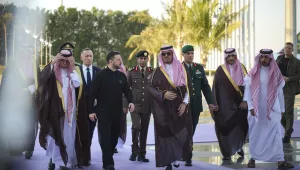This seminar has been postponed due to inclement weather. Confirmed registrants will be updated directly by email when the event is rescheduled.
The introductory seminar to the Spring 2015 stugy group "Rethinking the Arab State: The Collapse of Legitimacy in Arab Politics" with Professor Michael C. Hudson, MEI Kuwait Program Visiting Scholar, Spring 2015 and Seif Ghobash Professor of Arab Studies and International Relations, Emeritus, Georgetown University. To learn more about the series, click here.
The always precarious stability of the newly-independent Arab states was not simply the product of threat and coercion--the so called "mukhabarat (police) state." It was also underpinned by legitimacy formulas that enjoyed broad resonance in Arab societies. The main ingredients of these "legitimacy cocktails" were nationalism, patrimonialism, and a social contract. With time the salience of these principles has eroded, culminating today in the chaos of the Arab uprisings. The protesters called for an end to arbitrary and corrupt autocratic rule--for democracy and accountability. Now radical Islamism has emerged as a revolutionary but deeply contested alternative. Competing communal identities, growing socioeconomic inequalities, new information technologies and social media, regional rivalries and foreign intervention pose daunting challenges in the way of developing new legitimacy for states, regimes and leaders. And we have seen in some countries the reemergence of the "deep state." Will "persistent authoritarianism" reemerge or does democracy still have a chance?
Please note: registration for this event has now closed. You will have received a separate email if you are confirmed to attend.
Study Group participants are encouraged to buy or loan the following book. This seminar will focus on topics covered in Chapter 1 of the book:
Beyond the Arab Spring: Authoritarianism and Democracy in the Arab World. Brynen, Rex, Moore, Pete W., Salloukh, Bassel F., Zahar, Marie-Joelle, Lynne Reinner Publishing, November 2012.
Additional Reading: The State in the Middle East and North Africa. Anderson, Lisa, Comparative Politics X, X (October 1987, 1-18).
About Michael C. Hudson:
Michael C. Hudson is the Kuwait Foundation Visiting Scholar at the Middle East Initiative for spring 2015. He is also the Seif Ghobash Professor of International Relations and Arab Studies, Emeritus, at Georgetown University. For many years he was Director of Georgetown’s Center for Contemporary Arab Studies. From 2010 to 2014 he was the first Director of the Middle East Institute and Professor of Political Science at the National University of Singapore. He holds a B.A. from Swarthmore College and the M.A. and Ph.D. in political science from Yale University.
Professor Hudson has held Guggenheim, Ford, and Fulbright fellowships and is a past president of the Middle East Studies Association. Among Prof. Hudson's publications are The Precarious Republic: Political Modernization in Lebanon (1968, 1985); The World Handbook of Political and Social Indicators (1972, co-author); Arab Politics: The Search for Legitimacy (1977), The Palestinians: New Directions (editor and contributor), and Middle East Dilemma: The Politics and Economics of Arab Integration (1999, editor and contributor). His most recent book (2014) is Gulf Politics and Economics in a Changing World (co-editor and contributor). He has been interviewed or written for the BBC, PBS, National Public Radio, Al Jazeera, Channel News Asia, CNBC, Bloomberg TV, Thomson Reuters TV, CCTV, Jadaliyya, and major newspapers.



